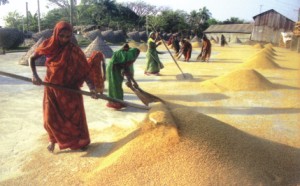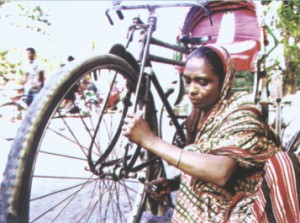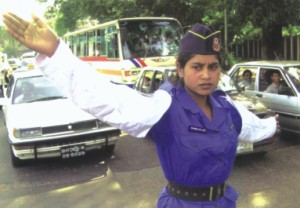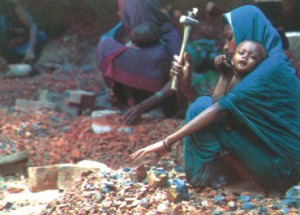Impressions
Working
Women Get a Raw Deal
Kavita
Charanji
 Rallies,
discussions, processions and cultural programmes marked the
observance of International Women's Day (March 8) globally.
This historic day was an opportune time for social activists
and women at large to reassess the successes and failures
of the previous year, and chalk up a plan of action for the
future. Rallies,
discussions, processions and cultural programmes marked the
observance of International Women's Day (March 8) globally.
This historic day was an opportune time for social activists
and women at large to reassess the successes and failures
of the previous year, and chalk up a plan of action for the
future.
Women
certainly have come a long way. While in the 1950s even highly
educated women had to reconcile themselves to life within
their homes, today the whole scenario has changed. No longer
does one find women solely as teachers, nurses--and maybe
secretaries-- they have made a niche in professions such as
medicine, information technology, journalism and advertising.
Large numbers of women also work in the industrial sectors
of garments, jute, textiles, pharmaceuticals, electronics
and chemicals.
Today
these women are conscious of their rights and their contribution
to the economic, social, political and cultural spheres.
What
about the less privileged women? They are increasingly stepping
into the informal sector in a diversity of professions. Capturing
these women on the camera--whether as agricultural workers,
shop vendors, hawkers, potters, weavers or 'just mothers'--is
a book called Women at Work Women in Struggle. With
striking photographs of working women, the aim of this book
brought out by the NGO Karmojibi Nari (KN), is to put the
women's role in proper perspective.
As Shirin
Akhter, president of (KN) , says in her foreword to the book,
"Thousands and thousands of women workers have joined
industry, specially the garments industry, as industrial workers.
Historically neglected women have achieved recognition as
'working women'. Needless to say, such a change in the role
of women has not been and still is not easy."
 Apparently
the underprivileged women in the informal sector carry a heavier
load than their urban counterparts. Like the latter, these
women have to combine work with childbearing and rearing.
However, the dual role falls heaviest on low-income women
in developing countries who supplements her family's income
through her work. Apparently
the underprivileged women in the informal sector carry a heavier
load than their urban counterparts. Like the latter, these
women have to combine work with childbearing and rearing.
However, the dual role falls heaviest on low-income women
in developing countries who supplements her family's income
through her work.
"Women
are workers but they do not have recognition or dignity. We
are struggling for them to be treated with dignity,"
says Rokeya Rafique, team leader of Theatre Art Unit and director
in KN, a working women's organisation that aims to achieve
equality, for women.
Another
group that is active at the grassroots level is Nijera Kori
(NK). It's target group comprises men and women who earn their
living mainly through physical labour. "Our mission is
the empowerment of the rural poor through creating their own
autonomous organisations at the grassroots, says Khushi Kabir,
co-ordinator of NK. In a departure from the norm, the organisation
shuns the path of giving out loans to the poor. As Kabir says,
"We are sceptical about giving loans. Some of us who
have come from various other organisations saw that loans
created a very strong dependency."
Some of
the changes are apparent. For instance, women were first elected
to local bodies in 1973. the Union Parishad (UP) elections
of 1997 is a milestone in the history of political empowerment
of women in Bangladesh. The government enacted a law for direct
elections to reserve seats for women in local level elections.
In the UP elections 12,828 women were directly elected in
reserved seats. Besides 20 women were elected as chairpersons
and 110 women were elected as members.
Nevertheless
there is much ground to traverse for working women in both
the formal and informal sector. Though there are several laws
on paper, such as the Maternity Benefit Act (1939), rights
relating to child care centres (Factory Act-1965), Principle
of equal remuneration (The Minimum Wages Rules--1961), women
cannot access these rights because they lack bargaining power
and are in dire need of jobs and money. A lot of women in
the garments sector do not have contracts, appointment letters
or adequate security measures, say women activists. Further
they are not allowed to unite in trade union, if they do they
are branded as trouble makers and sacked.
 "There
are loopholes in the law and they are not implemented fully.
Furthermore, there is no proper monitoring mechanism."
says Sultana Kamal, executive director of Ain o Salish Kendra,
a well known legal and human rights resource centre. The government
often bows down to the pressure of the industrialists or groups
who are actually controlling the economy. That is why it is
difficult for the government to be strict with them. "We
are asking for equal wage for equal work for women and security
measures," says Sultana. "There
are loopholes in the law and they are not implemented fully.
Furthermore, there is no proper monitoring mechanism."
says Sultana Kamal, executive director of Ain o Salish Kendra,
a well known legal and human rights resource centre. The government
often bows down to the pressure of the industrialists or groups
who are actually controlling the economy. That is why it is
difficult for the government to be strict with them. "We
are asking for equal wage for equal work for women and security
measures," says Sultana.
Despite
their contribution to the country's economy, women in the
informal sector remain 'invisible' as they are neither visible
nor audible.
In sum,
their labour is not recognised as work. As one activist points
out, agricultural labour is automatically associated with
men rather than women.This is one area where activists believe
there is much ground to cover.
It's time
that the government got together and displayed a political
will to give women their full due. It may be a long and winding
road till women are taken seriously by men and the powers
that be, but the process has been set in motion.
Ultimately,
the one day earmarked for women is likely to have a ripple
effect. In the words of Shirin Akhter, "International
Women's Day was an opportune time for women to stand up with
hope to achieve their demands, goals and dreams."
Many
poor women have pulled themselves out of the morass of poverty
and ignorance. They , in fact, have shown that it is possible
for them to stand on their own feet and live a life of dignity.
 Take
Sufia Begum of Etbarpur village under Chandina thana in Comilla
district. Sufia never had a chance for education and got married
at the age of 16. Her conservative in-laws discouraged her
from interaction with the outside world. In 1982 when NK began
social mobilisation in the disadvantaged areas of the district,
they came in contact with Sufia. Though she had a hard time
of trying to convince her in-laws and husband about joining
the landless group, eventually she formed her first group
in 1984 along with the members of the family. Within six months,
all the members elected her as the finance secretary of the
group. Take
Sufia Begum of Etbarpur village under Chandina thana in Comilla
district. Sufia never had a chance for education and got married
at the age of 16. Her conservative in-laws discouraged her
from interaction with the outside world. In 1982 when NK began
social mobilisation in the disadvantaged areas of the district,
they came in contact with Sufia. Though she had a hard time
of trying to convince her in-laws and husband about joining
the landless group, eventually she formed her first group
in 1984 along with the members of the family. Within six months,
all the members elected her as the finance secretary of the
group.
However,
Sufia had to contend with severe pressure from the so-called
leaders of the society. She fell a victim of fatwa several
times and pressure was put on her husband to divorce her.
She was also blamed for being a sinner since she did not have
a baby.
However,
Sufia did not give up so easily. She approached a doctor who
proved that the blame of infertility given to her was false
and evil-designed. Though the fundamentalists again raised
the demand to expel Sufia from society, her increasing popularity
made it hard for them to do so. Sufia also formed a group
for the landless people comprising of husbands of female group
members. Finally, her family also began to see the light.
Her husband,
a rickshaw puller, and her jointly began sharecropping by
taking a lease of land. Due to Sufia's determination and courage,
her family has attained a distinct position in society. She
received Tk 7,200 in four times from the savings and profit
distributed among the members by the group. With this amount,
she took a lease of cultivable land and purchased a rickshaw.
There have been several other achievements: they have rebuilt
their mud house with tin roof. Though they were illiterate,
now they can read the newspapers.
Sufia
got elected as the president of the village committee, area
committee and in the year 1997, she got elected with a huge
margin in the union council election. Now she is busy conducting
village salishes, bargaining and sharing views with the local
administration and performing as cultural activist at the
national level. Despite the previous fierce opposition from
her family members and previous foes, today she commands a
great deal of respect in her community.
Copyright
(R) thedailystar.net 2005
|
